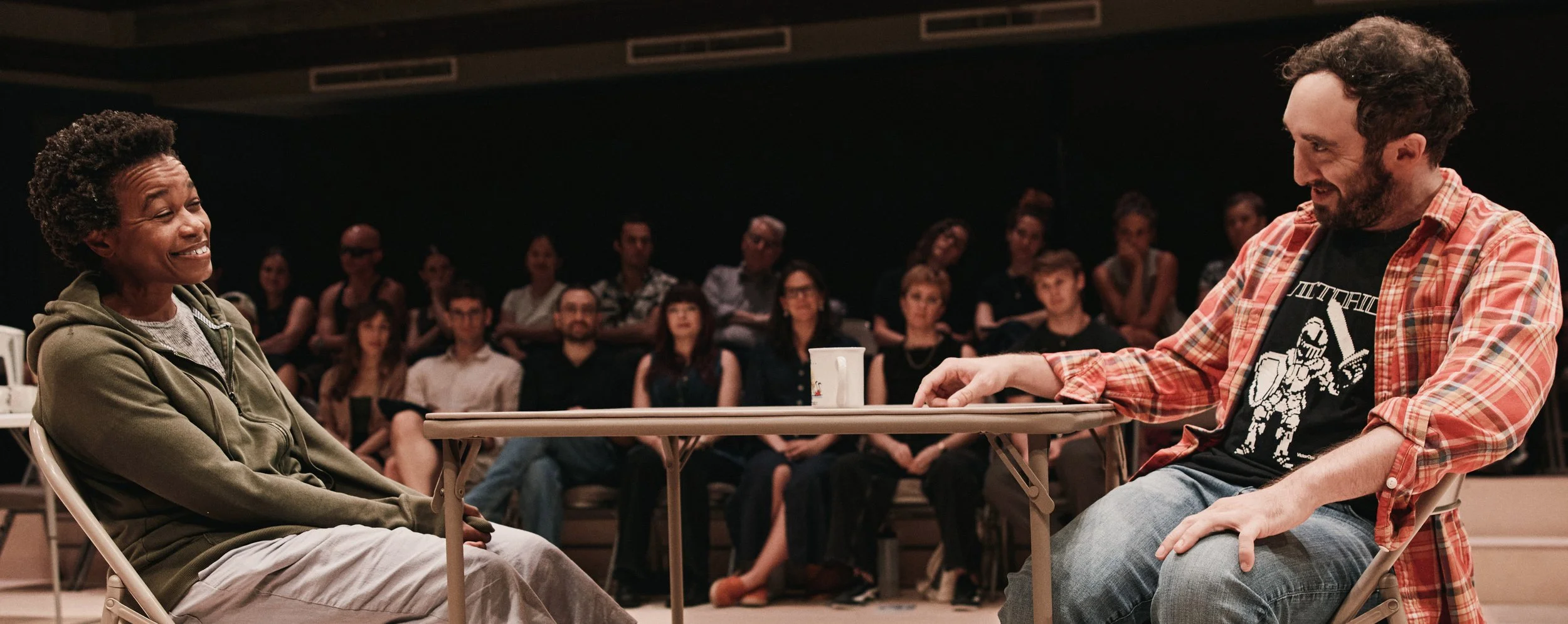Maggie (Quincy Tyler Bernstine) discusses Marv, her late husband, with his cousin Wally (Will Dagger) in Bubba Weiler’s Well, I’ll Let You Go at The Stage at Irondale Center.
Well, I’ll Let You Go is written by actor Bubba Weiler, who’s a little over 30, and directed by Jack Serio, still under 30 and seemingly ubiquitous in New York theater. It’s set in a mid-size, midwestern town that has lost its skill-based, manufacturing economy. Weiler’s characters are adjusting, in sundry ways, to coarsening influences, including the regional fulfillment facility of a gargantuan online retailer, which is the town’s sole surefire source of regular employment. Weiler and Serio bring a balance of intellect and feeling to this work, and the result is a fresh, engrossing chronicle of ordinary citizens contending with change for the worse.
Michael Chernus narrates Well, I’ll Let You Go, adding moments of omniscient explication and stream-of-consciousness to Weiler’s dramatic storytelling. Photographs by Emilio Madrid.
At the center of the play is level-headed Maggie (Quincy Tyler Bernstine), a former teacher and the kind of neighbor who makes sure everyone crossing her threshold gets a sympathetic ear and a cup of good, hot coffee. Now, though, Maggie’s the one in need. Her husband, Marv, has been slain by a gunman on the campus of the local community college. Marv appears to have intervened when the shooter was menacing a nursing student (Cricket Brown), and Maggie’s neighbors are calling him a hero for saving the student’s life and possibly preventing greater bloodshed. Word is spreading that the gunman has been part of protests at a nearby Planned Parenthood clinic, and some say that, when Marv was shot, the student had just returned to campus from that clinic.
For Maggie, things don’t add up: Marv had no known connection to the college or the student, and no evident reason for visiting the campus that morning. Maggie is stymied by nagging questions (including the possibility that Marv and the student were lovers). Those around her insist she should be focusing on last rites. As a funeral planner (Constance Shulman) tells her: Marv’s “not just yours anymore … he’s important to this community which is in mourning … and when people are mourning they need a funeral because” that’s “what they’re comfortable with and used to and it’s what we’ve agreed upon—as a society.” Maggie is emphatic: “I can’t plan a funeral because I don’t know what kind of funeral [Marv] deserves. … I can’t bury someone … I don’t know.”
Michael Chernus is the play’s narrator, whose plummy speeches flirt with excess, both in length and style. Reminiscent of the Stage Manager in Thornton Wilder’s Our Town, Chernus delivers flurries of novelistic omniscience and stream-of-consciousness prose. At some points, the narration enriches the characterization unfolding in dialogue; at others, it’s cumbersome and intrusive in a script that, overall, is as effectively uncluttered as Frank J. Oliva’s minimalist stage design.
The narrator’s observations may be more important for subsequent productions but, in this premiere, all the performers are fully capable of acting any feelings or motivations Weiler hands them without the narrator’s gloss. Nevertheless, Chernus is a vital part of the production.
Amelia Workman is Julie, Maggie’s passive-aggressive sister-in-law and childhood friend, in Well, I’ll Let You Go.
Weiler has constructed the play as a series of duologues, interspersed with Chernus’s narration, in which Maggie converses with individuals who have varying amounts of relevant information about Marv and what has happened. This format is more typical of the early scenes in a police procedural, with its witnesses and experts, than it is of character-driven domestic drama; but, in Weiler’s hands (unlike in TV cop shows) none of the roles are ciphers or mere plot devices. Efficient portraiture, intricate even when miniature, is this writer’s strong suit. And he and Serio have superlative actors executing what’s been written (though, with the traverse seating of Oliva’s scenic design, occasional lines are lost for spectators exposed only to the back of an actor’s head).
Among those interacting with the masterly Bernstine are Danny McCarthy as Jeff, Marv’s shifty brother; Amelia Workman as Jeff’s passive-aggressive wife; and Will Dagger as Marv and Jeff’s emotionally broken cousin.
Emily Davis—creepy at first, yet ultimately a sympathetic mess—is an evasive stranger begging to speak with Maggie but unwilling to reveal her purpose unless they meet in person. As the funeral planner, Shulman provides the play’s most protracted comic relief, evoking the extravaganza she wants to stage around an open casket and skating clear of Maggie’s empathetic query as to how she got involved in the undertaking industry.
The one-on-one conversations are Maggie’s means of gaining control of her disorderly emotions, as well as sleuthing the mystery of Marv’s death. For the audience, they create a verbal mosaic that, in the course of the performance, coalesces to form vivid portraits of Maggie, Marv, and their sad yet often funny little town.
Well, I’ll Let You Go, presented by Regular People, runs through Sept. 12 in the Space at Irondale (85 S. Oxford St., Brooklyn). Evening performances are at 7 p.m. Monday through Saturday; matinees are at 2 p.m. on Saturday. For tickets and more information, visit letyougonyc.com.
Playwright: Bubba Weiler
Direction: Jack Serio
Scenic Design: Frank J. Oliva
Costume Design: Avery Reed
Lighting Design: Stacey Derosier
Sound Design: Brandon Bulls
Original Music: Avi Amon





